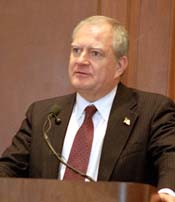 |
|
Theory vs. Practice by Mike Perricone
WASHINGTON, D.C.-A physicist taking
on a national policy role faces an inevitable and
inescapable question from colleagues in the
sciences: What about the issue of static-todeclining
funding for physics research?
John Marburger-physicist, former director
of Brookhaven National Laboratory, and, as
Director of the Office of Science and Technology
Policy, chief science advisor to the President of
the United States-took on the question as the
keynote speaker for the 27th annual Colloquium
on Science and Technology Policy of the American
Association for the Advancement of Science.
The question of physics funding, Marburger said, raises questions of its own.
"I don't believe anyone questions the need for more funding," Marburger said.
"I don't think anyone is not alarmed. But what's missing is a link to some
discriminating factor. Where do we apply the money? Does it go into existing
programs? Do we put it into one agency versus another agency? Do we
increase the National Science Foundation budget? How do we handle the
relationship of NSF and Department of Energy science?
"This is frustrating," he continued. "It's easier for the life sciences. It's easy
to lobby on questions of disease and cure. But the rest of the balance
[in research funding] is not so simple. We need to give advice to the
government, to provide a little more of a handle on how to do it and where
to go. The American public is skeptical after the end of the Cold War.
The national security hook is not there any more."
Marburger was confirmed as OSTP director in October 2001, in the aftermath
of the terrorist attacks on the U.S. As a physicist, he appreciates the historical
link between national defense and the physical sciences growing from the
Manhattan Project in World War II. He also appreciates that the link has now
been abridged by two dramatic world changes-the end of the Cold War
and the rise of terrorism-as evidenced by the title of the colloquium held
April 11-12: "Science and Technology in a Vulnerable World: Rethinking Our
Roles." As a scientist and policy maker, he's in the middle of the conflict.
Marburger said the concept of "balance" in the
research funding portfolio was "misleading, and
maybe even dangerous," implying a balance
among all the different areas of science-for
example, doubling funding in other areas apace
with doubling funding for the National Institutes
of Health by FY03.
"The presidential priorities state that research in the
life sciences merits a substantial increase," he said.
"Other priorities have not drawn as much funding,
but other priorities will emerge over the course
of the Administration. Congress appropriates the
money, and Congress has to share in the vision."
To Marburger, the war against terrorism does
not loom as a significant driver of science,
because terrorist targets are not limited to facilities
controlled by the federal government. He refers
to basic and applied science as "discovery" and
"issue" science, respectively. He
does not see the "spinoff" argument
as a solid basis for science policy,
believing that science itself has
intrinsic needs, and resources
devoted to solving a social issue
(for example, terrorism) will benefit
only those areas of science directly
related to that issue.
Marburger sees a key question
as how to evaluate basic science.
For example, is there a rational
way to establish an end date for an
experiment? Can the peer review
process be made more explicit,
and applied across scientific fields?
And he would like to put the tools
of social science to work in a
methodical evaluation of the basic
sciences; he believes private industry "seems to
have a more academic approach to management"
than does the academic sector.
"We have an unprecedented ability to control
matter, both organic and inorganic," Marburger
said. "The process of delivering funding to
programs is very complicated. We need language
to form the framework for discussion, not just
doubling here and doubling there. I prefer this
language to be more science-based for the
advice that drives the funding."
|

 "A good solution is to add a lot more money to
everything-in theory," he said. "In practice, there
is only a limited amount of money. The war against
terrorism is expensive. We're in a different
economic climate than we expected."
"A good solution is to add a lot more money to
everything-in theory," he said. "In practice, there
is only a limited amount of money. The war against
terrorism is expensive. We're in a different
economic climate than we expected."
 Constructing a vision is the challenge to a policy
maker. Marburger the scientist sees the need for
a rational and methodical process.
"We cannot fund all the sciences, all the time,
to the full extend that we'd like," he said.
"Choices need to be made. We need to advise
the government on how to evaluate and make
those choices wisely, and not leave them to
random decisions of the public finance process."
Constructing a vision is the challenge to a policy
maker. Marburger the scientist sees the need for
a rational and methodical process.
"We cannot fund all the sciences, all the time,
to the full extend that we'd like," he said.
"Choices need to be made. We need to advise
the government on how to evaluate and make
those choices wisely, and not leave them to
random decisions of the public finance process."